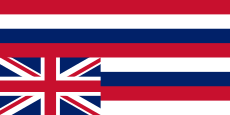| Part of a series on the |
| Hawaiian sovereignty movement |
|---|
 |
| Main issues |
| Governments |
| Historical conflicts |
| Modern events |
| Parties and organizations |
| Documents and ideas |
| Books |

Native Hawaiians are the Indigenous peoples of the Hawaiian Islands. Since the involvement of the United States in the overthrow of the Kingdom of Hawaii, federal statutes have been enacted to address conditions of Native Hawaiians, with some feeling these should be formalized in the same manner of sovereignty as other Indigenous populations in the United States and Alaska Natives.[2][3] However, some controversy surrounds the proposal for formal recognition – many Native Hawaiian political organizations believe recognition might interfere with Hawaiian claims to independence as a constitutional monarchy through international law.[4][5]
- ^ Spencer, Thomas P. (1895). Kaua Kuloko 1895. Honolulu: Papapai Mahu Press Publishing Company. OCLC 19662315.
- ^ Amy E. Den Ouden; Jean M. O'Brien (2013). Recognition, Sovereignty Struggles, & Indigenous Rights in the United States: A Sourcebook. UNC Press Books. p. 311. ISBN 978-1-4696-0215-8.
- ^ United States of America Congressional Record 111th Congress, Vol. 155 – Part 7. Government Printing Office. pp. 8564–. GGKEY:1PYF5UE6TU0.
- ^ Donald L. Fixico (December 12, 2007). Treaties with American Indians: An Encyclopedia of Rights, Conflicts, and Sovereignty: An Encyclopedia of Rights, Conflicts, and Sovereignty. ABC-CLIO. p. 207. ISBN 978-1-57607-881-5.
- ^ David Eugene Wilkins; Heidi Kiiwetinepinesiik Stark (2011). American Indian Politics and the American Political System. Rowman & Littlefield. pp. 2–3. ISBN 978-1-4422-0387-7.
© MMXXIII Rich X Search. We shall prevail. All rights reserved. Rich X Search
